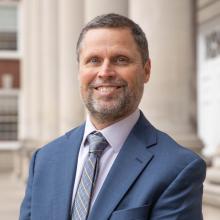Connecting With Others from a Place of “Enlightened Self Doubt”

There is a set of core values international educators share, which allows them to weather storms and reaffirm their commitment to international education. This is what separates values from skills—without the latter, we would be unable to perform at the required level of competence; but without the former, we would lack a sense of purpose and a reason for doing what we do.
In an era of fast-paced technological change, I find solace in the African proverb that says, “If you want to go fast, go alone. If you want to go far, go together.” Technology can accelerate many positive trends, such as innovation and access to information. It is not lost on international educators that without technology, higher education would have suffered not just disruption during the pandemic—it would have halted altogether.
However, the flip side of technology is its capacity to amplify feelings of isolation and exclusion. Against this background, one of the values that has most defined my sense of purpose during this past year has been connecting with others.
As an international educator in the United States, I have not been immune to the deleterious effects of the politicization of contentious topics, such as immigration or the war in Ukraine. To mitigate these effects, I have endeavored to remain true to the value of connecting with others, which has enabled me to continue contributing to a culture of sharing and learning.
Together for a Common Purpose
I work for a program that serves international students from very diverse backgrounds. We currently have students from Afghanistan, Brazil, China, Japan, Kazakhstan, Russia, Saudi Arabia, South Korea, and Ukraine—to name a few. Like my own home country of the United States, these countries have all experienced some degree of disruption and uncertainty in recent times. Bringing students together from these countries for a common purpose is a great reminder for me that even during difficult times, connection is always possible—and that people are naturally predisposed to commingle and share positive experiences.
To provide an example, this year, on the Friday before Halloween, we held a costume party for our students, instructors, and staff. Something unexpected happened when we allowed ourselves to play different roles for a few hours: we all connected with one another, and we had fun. It was a brief reminder of the innate desire for play that we have as human beings.
This impulse is part of the DNA of international education. Anyone who has lived abroad and laughed at themselves—for instance, after making an innocent language error—can relate to the deep human need to feel free to be spontaneous and vulnerable. Interestingly, it is often our lack of knowledge that allows us to connect with others.
International education, perhaps like no other domain in higher education, gives us permission to connect meaningfully with others through our ignorance, rather than through our proficiency or skills. This has led me to understand that connecting with others is as much about being knowledgeable as it is about being humble and aware of gaps in our knowledge. As I contemplate the year ahead of us, I would hope to remember that.
Enlightened Self-Doubt
A friend and mentor of mine argues that we are—all of us—connected, whether we like it or not. To paraphrase a famous wizard of Middle Earth, that is not for us to decide: what we get to decide is the manner and quality of that connection. A punch in the face—he says facetiously, but cogently—is one way to “connect” with another person. Receiving someone with open arms is another.
He is a follower of the traditional African philosophy of ubuntu. In its purest, most succinct form, he describes the philosophy, thus: ”I am because we are.” As I look to the year 2023 and beyond, I will carry with me this simple phrase.
That same friend and mentor told me that humility and self-doubt are like small pieces of wood one throws into the fire—it keeps the flame burning and keeps us honest and curious. I am reminded of my first trip abroad as an undergrad, 35 years ago. As I was boarding the plane in New York City, bound for my destination across the Atlantic, I was delirious with excitement—but also terribly nervous about my limited knowledge of the country that I was about to visit. This feeling was not rooted in shame, but in what I would call enlightened self-doubt. I believe that the day I lose that feeling is the day I am no longer worthy of calling myself an international educator. •
David Lind, EdD, is director of international programs, College of Professional Studies, at Syracuse University.
About International Educator
International Educator is NAFSA’s flagship publication and has been published continually since 1990. As a record of the association and the field of international education, IE includes articles on a variety of topics, trends, and issues facing NAFSA members and their work.
From in-depth features to interviews with thought leaders and columns tailored to NAFSA’s knowledge communities, IE provides must-read context and analysis to those working around the globe to advance international education and exchange.
About NAFSA
NAFSA: Association of International Educators is the world's largest nonprofit association dedicated to international education and exchange. NAFSA serves the needs of more than 10,000 members and international educators worldwide at more than 3,500 institutions, in over 150 countries.
NAFSA membership provides you with unmatched access to best-in-class programs, critical updates, and resources to professionalize your practice. Members gain unrivaled opportunities to partner with experienced international education leaders.















